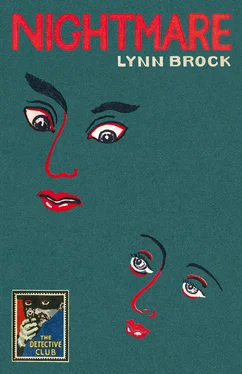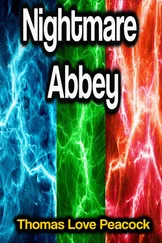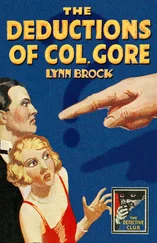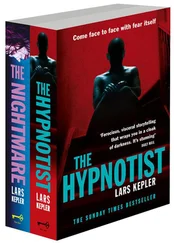For five minutes, measured by a clock upon which she kept a watchful eye, Miss Prossip plied her needle industriously. She rose then and, joined by Agatha, hopped on one foot along the corridor, into a bedroom at the end of it, around the bedroom three times, and then back along the corridor to the sitting-room, where, rather blown, she resumed her sewing. No slightest change of expression manifested itself in her sulky, sallow face while she performed these curious gymnastics, which she executed with the solemnity of a ritual. In the agile Agatha, however, the awkward heaviness of her broad-beamed superior evoked a special gaiety. As she hopped behind Miss Prossip’s labouring clumsiness, she giggled happily.
Another five minutes passed and again Agatha entered the sitting-room, having again attended to the gramophone. Miss Prossip arose and faced her silently. Then, together, they sprang ceilingwards.
Some time later Mr Knayle had the curiosity to make some enquiries about Miss Prossip. He learned that she had always been regarded by people who knew her as of perfectly normal intelligence and general behaviour, had been educated at the local High School, (a celebrated one) where she had been considered by her mistress a rather clever girl, if somewhat difficult and moody, was passionately fond of music and played the violin with talent, and, in general, had been considered a perfectly normal and sensible person. Mr Knayle himself had frequently encountered her in the front garden and exchanged ‘good mornings’ and ‘good afternoons’ with her. His personal estimate of her, until the outbreak of the present hostilities, had been that she was a perfectly sane, if exceedingly unattractive, young woman. Slightly more intent observation of her, in the course of the past few weeks, had afforded him no reason to revise this opinion. Nothing that he ever subsequently learned about her or her family history ever afforded him the slightest reason to revise it. And so the fact is to be accepted that Marjory Prossip was an intelligent, well-educated, well-behaved, industrious, quiet girl of thirty, an accomplished violinist, and very fond of the kind of music which abhors tunes and never says the same thing twice.
In the sitting-room of the first-floor flat, directly beneath those four prancing feet, Simon Whalley sat at a small oval table near the open windows. He was tallish, black-haired, grey-eyed, like Mr Knayle, clean-shaven, in his middle-forties and rather noticeably thin. The well-cut lounge suit which he wore fitted him excellently and yet had the effect of having grown a size too large for him. On the table were an ash-tray, half full of cigarette ends, and a writing-block. Three sheets had been detached from the block and lay crumpled-up on the carpet beside his chair—a severely un-easy chair, imported from the dining-room. On a fourth sheet, beneath the carefully-written heading ‘CHAPTER XVII’, he was drawing with a fountain-pen a design of intricate and perfectly unmeaning arabesques.
Over this task, which had occupied him for the past half-hour, he was bent in concentrated absorption, thickening a curve here with nicety, rounding off an angle there, finding always a new joining to make or a new space into which to crowd another little lop-sided scroll or lozenge. At regular intervals, automatically, his left hand removed a cigarette from his lips, tapped it against the ashtray and replaced it. Whenever he lighted a new cigarette from the old one, his eyes made a curiously methodical and concerned journey round the room, beginning always at the window-curtain to his left hand and travelling always round to the armchair, which stood just beside the oval table, at his right. As they made this circuit slowly, they examined each object upon which they rested with an anxious intentness. From the armchair they glanced always to a small, stopped clock on the mantelpiece and then returned, slowly and reluctantly, to the writing-block.
The room was a large, rather low-ceilinged one, quite charming to the cursory eye with its biscuit-coloured wall-paper, bright carpet and curtains and rugs and chintzes, rows of dwarf book-cases, easy chairs and bowls of roses. It was sufficiently high up to escape serious molestation by the noise of Downview Road’s voluminous summer traffic. Its windows looked out across the road, over the wide, pleasantly-timbered expanse of Rockwood Down. It was a friendly, cheerful, comfortable room, and Whalley hated it and everything in it with a hatred that was all but horror.
As he sat elaborating his futile design, his mutinous brain, refusing stubbornly to perform the functions which had once been its delight and relief, persisted in exploring, for the hundredth-thousandth time, the emotion of nauseated distrust and apprehension which the room now evoked in him whenever he entered it or even looked into it. No aim directed this vague, depressed analysis; no satisfaction or hope of remedy resulted from it. It proceeded always, however, he had observed—for it had long ago become a subconscious activity, so persistent as to attract his uneasy attention—along the same line.
It began always with the furtive, secret dinginess and decay that underlay the room’s superficial brightness and freshness—began, oddly, always with the same window-curtain.
Pretty curtains. But they had been up for two years now. When you shook them you found that they were thick with dust. They had faded a lot. There was a small tear in the left-hand one, at the bottom. Bogey-Bogey’s work.
The windows. It must be two months at least since the windows of the flat had been cleaned. Seven-and-six … but they must be done. A nuisance, the window-cleaner, in and out of the rooms with his bucket and his sour-smelling cloths and his curious watching eyes. And then there was that broken sash-cord. And the cracked pane.
The roll-top desk. Lord, what a litter it was in! All those pigeon-holes … full of dust and rubbish. What an uncomfortable brute of a thing it was to sit at. Much too high and too narrow. And your legs were always cramped. He had paid fourteen pounds for it, and had never succeeded in writing a sentence at it …
The chintz covers. They had faded badly, too. All of them wanted cleaning, especially those of the armchairs, which were perfectly filthy …
A leg of that arm-chair wanted repairing.
The rain last winter found its way through the wall up there, above the fireplace, cracked the plaster, and stained the paper. That watercolour below the stain had begun to mildew and blotch …
The fireplace would have to be seen to before the autumn; its back had burnt out, and a lot of the tiles had cracked. The chimney must be swept, too, before the autumn. That would mean that the whole room would have to be turned topsy-turvy in preparation for the sweep and cleaned right out when he had finished. A woman would have to be got in to do that job. Ten shillings. And the room unusable for the whole day.
The carpet. All right until you looked closely. Then you saw that it was dotted all over with little stains and thickly covered with Bogey-Bogey’s hairs. It would have to come up and go to the cleaners, also. And one couldn’t use the room without a carpet.
The Crown Derby set on the Welsh dresser. Thick with dust. A two hours’ job to collect it, piece by piece, and carry it out to the kitchen and wash and dry it and carry it back and arrange it on the dresser again. He had smashed a cup last time he had done that job, three or four—no, it must be six months ago—before last Christmas—and spoiled the set. Clumsy brute, always smashing things. It had worried him ever since, whenever he had looked at it, to think that the set was a cup short.
Читать дальше












